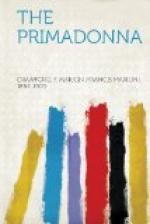There was the other way, which was now prepared, and the Greek had learned enough about his victim to justify him in using it. The cypher expert, who had been at work on Feist’s diary, had now completed his key and brought Logotheti the translation. He was a rather shabby little man, a penman employed to do occasional odd jobs about the Foreign Office, such as engrossing documents and the like, by which he earned from eighteenpence to half-a-crown an hour, according to the style of penmanship required, and he was well known in the criminal courts as an expert on handwriting in forgery cases.
He brought his work to Logotheti, who at once asked for the long entry concerning the night of the explosion. The expert turned to it and read it aloud. It was a statement of the circumstances to which Feist was prepared to swear, and which have been summed up in a previous chapter. Van Torp was not mentioned by name in the diary, but was referred to as ‘he’; the other entries in the journal, however, fully proved that Van Torp was meant, even if Logotheti had felt any doubt of it.
The expert informed him, however, that the entry was not the original one, which had apparently been much shorter, and had been obliterated in the ordinary way with a solution of chloride of lime. Here and there very pale traces of the previous writing were faintly visible, but there was not enough to give the sense of what was gone. This proved that the ink had not been long dry when it had been removed, as the expert explained. It was very hard to destroy old writing so completely that neither heat nor chemicals would bring it out again. Therefore Feist must have decided to change the entry soon after he had made it, and probably on the next day. The expert had not found any other page which had been similarly treated. The shabby little man looked at Logotheti, and Logotheti looked at him, and both nodded; and the Greek paid him generously for his work.
It was clear that Feist had meant to aid his own memory, and had rather clumsily tampered with his diary in order to make it agree with the evidence he intended to give, rather than meaning to produce the notes in court. What Logotheti meant to find out was what the man himself really knew and what he had first written down; that, and some other things. In conversation, Logotheti had asked him to describe the panic at the theatre, and Cordova’s singing in the dark, but Feist’s answers had been anything but interesting.
‘You can’t remember much about that kind of thing,’ he had said in his drawling way, ’because there isn’t much to remember. There was a crash and the lights went out, and people fought their way to the doors in the dark till there was a general squash; then Madame Cordova began to sing, and that kind of calmed things down till the lights went up again. That’s about all I remember.’




